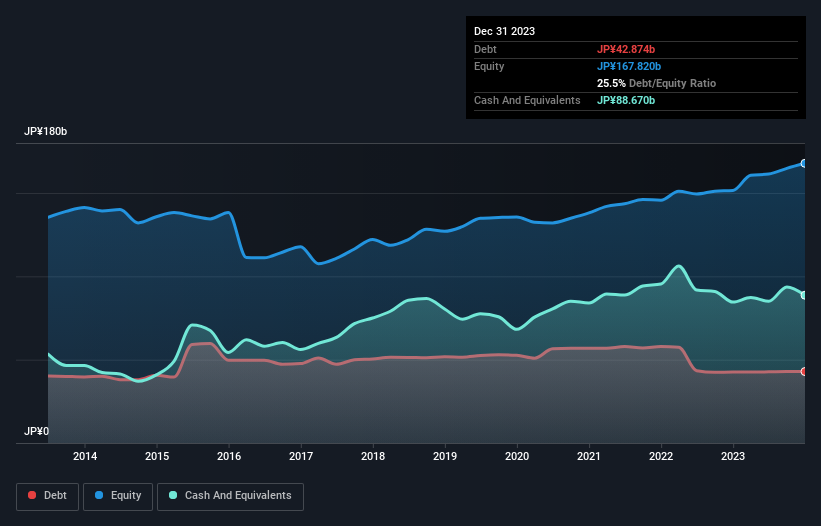These 4 Measures Indicate That Japan Steel Works (TSE:5631) Is Using Debt Reasonably Well

Some say volatility, rather than debt, is the best way to think about risk as an investor, but Warren Buffett famously said that 'Volatility is far from synonymous with risk.' So it might be obvious that you need to consider debt, when you think about how risky any given stock is, because too much debt can sink a company. As with many other companies The Japan Steel Works, Ltd. (TSE:5631) makes use of debt. But the real question is whether this debt is making the company risky.
Why Does Debt Bring Risk?
Debt is a tool to help businesses grow, but if a business is incapable of paying off its lenders, then it exists at their mercy. Ultimately, if the company can't fulfill its legal obligations to repay debt, shareholders could walk away with nothing. While that is not too common, we often do see indebted companies permanently diluting shareholders because lenders force them to raise capital at a distressed price. Having said that, the most common situation is where a company manages its debt reasonably well - and to its own advantage. When we examine debt levels, we first consider both cash and debt levels, together.
See our latest analysis for Japan Steel Works
How Much Debt Does Japan Steel Works Carry?
As you can see below, Japan Steel Works had JP¥42.9b of debt, at December 2023, which is about the same as the year before. You can click the chart for greater detail. But it also has JP¥88.7b in cash to offset that, meaning it has JP¥45.8b net cash.

A Look At Japan Steel Works' Liabilities
Zooming in on the latest balance sheet data, we can see that Japan Steel Works had liabilities of JP¥147.7b due within 12 months and liabilities of JP¥47.2b due beyond that. Offsetting this, it had JP¥88.7b in cash and JP¥61.1b in receivables that were due within 12 months. So it has liabilities totalling JP¥45.2b more than its cash and near-term receivables, combined.
Of course, Japan Steel Works has a market capitalization of JP¥288.1b, so these liabilities are probably manageable. Having said that, it's clear that we should continue to monitor its balance sheet, lest it change for the worse. Despite its noteworthy liabilities, Japan Steel Works boasts net cash, so it's fair to say it does not have a heavy debt load!
In addition to that, we're happy to report that Japan Steel Works has boosted its EBIT by 67%, thus reducing the spectre of future debt repayments. When analysing debt levels, the balance sheet is the obvious place to start. But ultimately the future profitability of the business will decide if Japan Steel Works can strengthen its balance sheet over time. So if you're focused on the future you can check out this free report showing analyst profit forecasts.
Finally, a business needs free cash flow to pay off debt; accounting profits just don't cut it. Japan Steel Works may have net cash on the balance sheet, but it is still interesting to look at how well the business converts its earnings before interest and tax (EBIT) to free cash flow, because that will influence both its need for, and its capacity to manage debt. In the last three years, Japan Steel Works's free cash flow amounted to 27% of its EBIT, less than we'd expect. That weak cash conversion makes it more difficult to handle indebtedness.
Summing Up
While Japan Steel Works does have more liabilities than liquid assets, it also has net cash of JP¥45.8b. And it impressed us with its EBIT growth of 67% over the last year. So we don't think Japan Steel Works's use of debt is risky. The balance sheet is clearly the area to focus on when you are analysing debt. However, not all investment risk resides within the balance sheet - far from it. Case in point: We've spotted 1 warning sign for Japan Steel Works you should be aware of.
If you're interested in investing in businesses that can grow profits without the burden of debt, then check out this free list of growing businesses that have net cash on the balance sheet.
New: Manage All Your Stock Portfolios in One Place
We've created the ultimate portfolio companion for stock investors, and it's free.
• Connect an unlimited number of Portfolios and see your total in one currency
• Be alerted to new Warning Signs or Risks via email or mobile
• Track the Fair Value of your stocks
Have feedback on this article? Concerned about the content? Get in touch with us directly. Alternatively, email editorial-team (at) simplywallst.com.
This article by Simply Wall St is general in nature. We provide commentary based on historical data and analyst forecasts only using an unbiased methodology and our articles are not intended to be financial advice. It does not constitute a recommendation to buy or sell any stock, and does not take account of your objectives, or your financial situation. We aim to bring you long-term focused analysis driven by fundamental data. Note that our analysis may not factor in the latest price-sensitive company announcements or qualitative material. Simply Wall St has no position in any stocks mentioned.
About TSE:5631
Japan Steel Works
Engages in the provision of industrial machinery products, and material and engineering business in Japan and internationally.
Excellent balance sheet with moderate growth potential.


